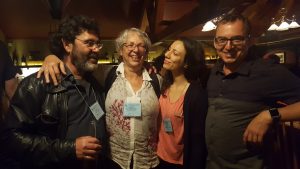At the Gordon Research Conference in Vermont, with (from right) Heinz Schandl (Conference Chair, IRP member and employed by CSIRO in Australia), Janet Salem from UNEP (Bangkok and formerly IRP Secretariat) and Esther van der Voet (IRP member from The Netherlands).
Just attended a Gordon Research Conference on Opportunities for the Critical Decade – Decoupling Well-Being from Environmental Pressures and Impacts that took place in Stowe, Vermonth, USA (near Burlington). I delivered the keynote at the first plenary – my talk was entitled ‘Anticipating the Governance Implications of Global and Urban Transitions: A Long-Wave Perspective’. Gordon Research Conferences have been going since the 1950s, and they are regarded as highly prestigious events in the natural science communities in Europe and the USA. Grants are given to particular scientific communities to hold conferences that must be organized in a specific way over a 5 day period and all proceedings are strictly confidential – what we call Chatham House Rules these days. The format works well: each speaker has 40 minutes followed by 20 minutes of discussion, and there are two or three speakers per session. Afternoons from lunch to 4pm are free for networking and informal discussions, and from 4pm to 6pm everyone meets to walk through posters by postgraduate students in order to discover the emerging new work by young scientists. I found the format refreshing, spacious and nourishing. I loved have 40 minutes to fully elaborate my thinking, and 20 minutes of discussion directed at my input, and I loved hearing others do the same. So different from the 10 minute panel format, or the pure discussion format that seems to be favored these days. Nothing wrong with these formats, but they do prevent one from really getting exposed to deep thinking by a recognized expert wrestling with new ideas. Presenters are specifically encouraged to talk about unpublished work, and to explore what may be unresolved. One speaker, for example, talked about his attempt to develop a forecasting instrument, and then used his talk to show how he failed. Most refreshing indeed. This conference was part of series of Gordon Research Conferences on industrial ecology started by Tom Graedel (Yale) about a decade ago. A Chair and Vice Chair are elected each year, and the Chair sets the theme and invites the speakers, but cannot him/herself be a speaker. I cannot recall when I last attended a conference where I learn something new from every speaker, especially in this in-depth format. Most of the speakers addressed research and issues that were new to me, although everyone shared a commitment to sustainability. So this was a really rewarding experience. I loved the fact that there were a number of members from the International Resource Panel, now meeting in a non-UN format – they included Heinz Schandl, Esther van der Voet, Sangwon Suh, Anu Ramaswami, Tom Graedel and Edgar Hertwich.
Also took time to drive around for a day before the conference and two days after – Vermont is so incredibly beautiful. Mountainous like the Western Cape, but one drives past miles and miles of forest. I did a forest walk in the Rutland Forest in Southern Vermont, and visited the Whole Systems Design permaculture farm run by Ben Falk (who wrote the book Whole Systems Design) in the Mad River Valley just south of Burlington. And then last night enjoyed Burlington’s Church Street Marketplace – a wonderful pedestrianized mainstreet brimming with buzz, street performers, music and restaurants – reminded my of The Ramblas in Barcelona, or the Pearl Street Mall in Boulder, or Piazza del Campo in Sienna. Just love those kinds of spaces. And before that walked the shores of Lake Champlain as the sun set, enjoying the sailing boats, skateboarders and guitar singers. There is a gentleness and unpretentiousness about Vermont that I appreciate. In a world threatened by Brexit and the rise of Donald Trump, this peaceful place in the far north east of the USA was a welcome way to spend a week.


Recent Comments